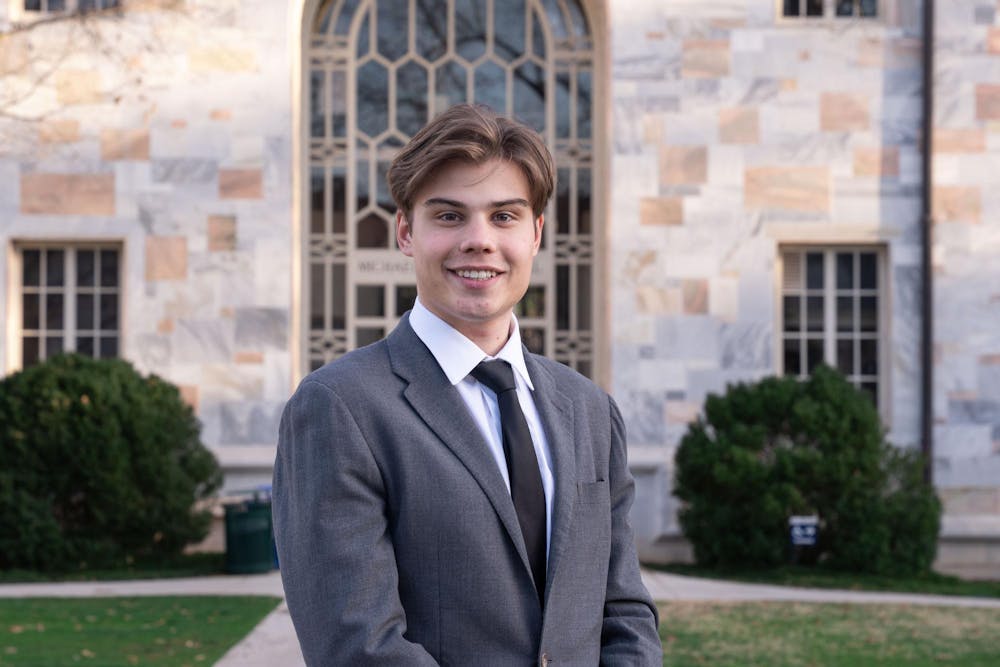Though designed to advocate for Emory College of Arts and Sciences (ECAS) students, Emory University’s College Council has often been relegated to secondary status by much of the student body due to being a “divisional council” that only represents ECAS within the larger Student Government Association.
However, Vlad Senenko (27C) offers an enthusiasm for the revitalized potential of College Council in his presidential campaign. As current College Council chief of staff, Senenko has a strong foundation of student government experience to build on during his presidential term. He is also optimistic about the organization’s potential for growth, citing a capacity for increased initiatives, such as internal governance reform, and commitment from its members. Senenko’s platform features an arsenal of ambitious ideas that promote technology accessibility, extending library hours and pressuring administration to make syllabi more available.
Senenko’s platform also includes initiatives to improve transparency within student government by clearly communicating funding opportunities and sending regular newsletters to ECAS students. Crucially, he acknowledged and critiqued the current lack of transparency between the student body and College Council, noting the need to better publicize governing documents and wanting to advertise College Council legislative sessions through social media. Senenko’s recognition of the need for openness is laudable, and he must make this a top priority if he takes office. While his ambitions are certainly lofty and idealistic, Senenko brings a combination of concrete experience and specific ideas for improving student life to his bid for the College Council presidency.
Senenko’s opponent is a newcomer to the arena of College Council and Emory student government more generally: Si Kai Feng (28C). Feng is a first-year student who restarted Emory College Republicans last fall, and his lack of student government has proved detrimental to his candidacy. At the Wheel Debates, Senenko asked Feng about his familiarity with administrators, particularly the Student Involvement, Leadership and Transitions office, and Feng seemed entirely unfamiliar with both administrative and student resources on campus. When asked about potential budget changes for the council, Feng suggested sourcing funding privately, alluding to his work with Emory College Republicans. The prospect of crowdsourcing funding for student resources is concerning due to its unpredictability and negative implications for donor influence over student government.
Even with his involvement as president of Emory College Republicans, Feng stated that College Council is an “apolitical institution” and plans to run it as such. Interestingly, Feng expressed strong disagreement with student stipends on any level — an idea that has been discussed among College Council legislators in the past few weeks. While Feng did not impress the Board in most other facets of his campaign, his distaste for using the Student Activity Fee (SAF) to fund individual student stipends was well-placed — as president, Senenko must preserve the integrity of the SAF fund in this same way.
The Emory Wheel’s Editorial Board is confident Senenko is the stronger presidential candidate and proudly endorses his campaign. However, the breadth of his ambitions may lead to an overly generous use of the College Council budget. During his speeches at the Wheel Debates and his interview with the Editorial Board, Senenko mentioned dipping into the Student Activity Fee (SAF) fund to support his many ideas. For example, he noted in his interview that he wished to establish a sort of “merit scholarship” for underrepresented students through College Council funding. While we can appreciate his good intentions, we do not believe that this drainage of the SAF would be a fair or productive use of College Council’s finite budget. Using this funding with such heavy-handedness leads to the very issue of siphoning funds away from club experiences and student events, which we referenced in our editorial regarding stipends for student leaders sourced from the SAF. If elected, we implore Senenko to narrow his scope and devote College Council resources to his highest priority issues, such as transparency, food accessibility and career resources, rather than spreading College Council thin trying to cover his bases.
The Board is proud to endorse Senenko for College Council president with hopes that he focuses on yielding tangible results for ECAS students and continues to advocate for student concerns.
Editorial Board Editor Marc Goedemans recused himself due to a conflict of interest with Senenko and was not involved in writing or editing this opinion.
The above editorial represents the majority opinion of The Emory Wheel’s Editorial Board. The Editorial Board is composed of Editorial Board Editor Marc Goedemans, Editorial Board Asst. Editor Carly Aikens, Opinion Asst. Editor Ethan Jacobs, Arts & Life Asst. Editor Hunter Buchheit, Allie Guo, Carson Kindred, Mira Krichavsky, Eliana Liporace, Niki Rajani, Josh Rosenblut, Ilka Tona and Crystal Zhang.




![IMG_0064[31].jpeg](https://snworksceo.imgix.net/whl/bd1509fc-0fff-41c3-8a17-14169776d877.sized-1000x1000.jpg?ar=16%3A9&w=500&dpr=2&fit=crop&crop=faces)

